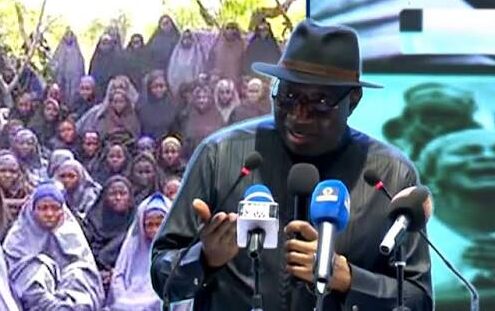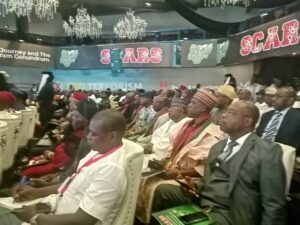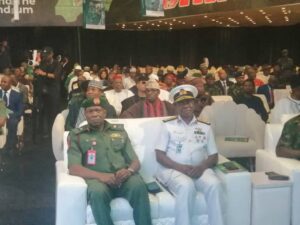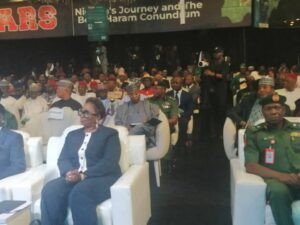‘I will die with the scars of Chibok Girls’ –Jonathan
- October 4, 2025
- 0
By: Goodluck E. Adubazi, Abuja. Former President Goodluck Ebele Jonathan has described the abduction of over 200 Chibok schoolgirls in 2014 as a “scar” he will carry to
By: Goodluck E. Adubazi, Abuja. Former President Goodluck Ebele Jonathan has described the abduction of over 200 Chibok schoolgirls in 2014 as a “scar” he will carry to

By: Goodluck E. Adubazi, Abuja.
Former President Goodluck Ebele Jonathan has described the abduction of over 200 Chibok schoolgirls in 2014 as a “scar” he will carry to his grave.
Speaking at the launch of a new book, “Scars: Nigeria’s Journey and the Boko Haram Conundrum,” written by retired General Lucky Irabor, on October 3, 2025, at the Transcorp Hilton, Abuja, Jonathan said no cosmetic or plastic solution could erase the trauma left by the tragedy.
“It’s a scar I will die with,” he said solemnly, adding that one day, the full truth might be told when Boko Haram leaders become literate enough to document their own story.

Jonathan recounted the complexity of the Boko Haram crisis, noting that the insurgency began during his tenure as Vice President in 2009 and intensified during his presidency.
“I thought we would wipe them out in a reasonable time. But today, Boko Haram is still with us,” he said.
He also drew comparisons with other conflicts in Nigeria, including the Niger Delta militancy, which he helped to resolve by directly engaging the militants in the creeks.

Obasanjo: Boko Haram Leaders Were Not After Politics or Religion, Just a Better Life
Former President Olusegun Obasanjo stated that during his personal investigations into Boko Haram, he discovered that the group was not driven by political or religious ideology but by a desperate quest for a better life.
Speaking as chairman at the book launch, Obasanjo reflected on his 2011 visit to Maiduguri after Boko Haram attacked the United Nations building in Abuja.
“They weren’t looking for political power or religious domination they just wanted a better life,” he said.

He emphasized that Nigeria has faced various security challenges since independence, but none as prolonged or misunderstood as Boko Haram.
“It’s been over 15 years and four administrations. Why is Boko Haram still part of our national reality?” he asked.
“Nigeria’s Brightest Years Were 1975 to 1979” Gen. Monguno Reflects at Book Launch
Major General Babagana Monguno (Rtd.), former National Security Adviser, called for a historical reassessment of Nigeria’s security challenges, asserting that the country’s most prosperous and hopeful years were between 1975 and 1979.

Delivering the keynote address at the book launch, Monguno described Boko Haram as a “terrible milestone” in Nigeria’s journey and highlighted the emotional and institutional impacts of the conflict.
“We’ve had a small window of happiness in 65 years. Those four years under military rule saw conscious efforts to rebuild society and reengineer the economy,” he said.
He urged that General Irabor’s book be made available in every public and private institution, citing its firsthand insights into the Boko Haram conundrum.
Family Values Are Collapsing, CDS Chris Musa Warns at Book Launch

Chief of Defence Staff, General Christopher Gwabin Musa, stated that the collapse of family values is fueling Nigeria’s worsening security crisis.
“National security begins with the family. We cannot win this war unless every Nigerian understands their role,” he said.
Musa stressed that defeating Boko Haram requires a “whole-of-society approach,” not just military action. He cited asymmetric warfare as a unique challenge, where the enemy is often invisible and embedded within communities.
“You can’t defeat ideology with bullets alone. You defeat it by changing mindsets,” he added.
Bishop Kukah: Every Unaccounted Child in Nigeria Is a Scar
Delivering a poignant book review, Bishop Matthew Hassan Kukah described Boko Haram’s impact as a “theology of destruction” and said Nigeria must revisit its foundational values.

Quoting scripture — “When the foundations are destroyed, what can the righteous do?” — Kukah traced Nigeria’s dysfunction back to 1966, citing a deep betrayal of public trust.
He recalled Boko Haram’s own statement: “Our name is not Boko Haram. We are Jihadists.” He emphasized the importance of understanding what led to their rise rather than merely fighting their symptoms.
“The destruction of the UN building and the abduction of the Chibok girls are not just events; they are national scars,” he said.
Sultan of Sokoto: Jihad Does Not Mean Kill – It Means Strive
The Sultan of Sokoto, His Eminence Alhaji Sa’ad Abubakar III, debunked common misconceptions about the term “jihad,” clarifying that it is not synonymous with violence.
“Jihad means to strive — to be a better Muslim, a better human, a better leader. It’s not about killing anyone,” he said.
Speaking at the book launch, the Sultan praised General Irabor for bringing together a diverse and high-profile audience, describing the event as a critical step toward national healing.
He challenged misconceptions about Boko Haram’s motives and corrected the notion that it was an Islamic or religious insurgency.
“No genuine Muslim kills. They fight for good governance and justice. The misuse of religion must be corrected,” he added.
“Welcome to a Landmark Book” Victoria Irabor Opens Launch with Heartfelt Message
In her welcome remarks, Mrs. Victoria Irabor, wife of the author and former Chief of Defence Staff, General Lucky Irabor (Rtd.), described the book “Scars: Nigeria’s Journey and the Boko Haram Conundrum” as a vital contribution to Nigeria’s national discourse.
Speaking through the Minister of Defence, Muhammadu Badaru Abubakar, she acknowledged the presence of distinguished guests including former Presidents Obasanjo and Jonathan, service chiefs, royal fathers, and other national figures.
“This book is more than a story. It is a legacy of service, sacrifice, and strategic reflection,” she said.
A Book That Dares to Tell Nigeria’s Truth
“Scars: Nigeria’s Journey and the Boko Haram Conundrum,” written by General Lucky Irabor (Rtd.), has sparked serious national reflection, bringing together former presidents, military chiefs, religious leaders, and scholars to confront the complex legacy of insurgency, governance, and national unity in Nigeria.
From Jonathan’s haunting confession to the Sultan’s doctrinal clarification, the event was more than a book launch — it was a collective reckoning with the past and a call to action for Nigeria’s future.